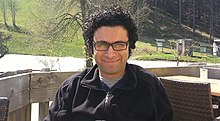Taha Yasseri
Taha Yasseri | |
|---|---|
 | |
| Born | Taha Yasseri 6 September 1984 |
| Nationality | British |
| Alma mater | Sharif University of Technology (MSc)[3] University of Göttingen (PhD) |
| Awards | Laureate Award, IRC, 2022. W. J. M. Mackenzie Book Prize, Political Studies Association, 2017. |
| Scientific career | |
| Fields | Complex systems Computational social science Network science Social data science Human dynamics[1] |
| Institutions | University of Oxford Oxford Internet Institute Alan Turing Institute |
| Thesis | Nanoscale pattern formation on ion-sputtered surfaces (2010) |
| Doctoral advisor | Reiner Kree[2] |
| Website | tahayasseri |
Taha Yasseri (born 6 September 1984) is a
Education
Yasseri was educated at
Research and career
Yasseri's research investigates complex systems, computational social science,[11] network science,[12] social data science and human dynamics.[1][13][14]
Wikipedia
Yasseri has studied the statistical trends of systemic bias at Wikipedia introduced by editing conflicts and their resolution.[15] His research examined the counterproductive work behavior of edit warring. Yasseri contended that simple reverts or "undo" operations were not the most significant measure of counterproductive behavior at Wikipedia and relied instead on the statistical measurement of detecting "reverting/reverted pairs" or "mutually reverting edit pairs". Such a "mutually reverting edit pair" is defined where one editor reverts the edit of another editor who then, in sequence, returns to revert the first editor. The results were tabulated for several language versions of Wikipedia. The English Wikipedia's three largest conflict rates belonged to the articles George W. Bush, Anarchism and Muhammad. By comparison, for the German Wikipedia, the three largest conflict rates at the time of the study were for the articles covering Croatia, Scientology and 9/11 conspiracy theories.[16]
In a study published by
Machine sociology and bots conflict
In a 2017 article titled "Even Good Bots Fight",
Social media and politics
Yasseri has studied the role of social media in politics. He has used Wikipedia page view statistics and Google search volumes to understand and potentially predict electoral popularity in different countries.[21] He has co-written Political Turbulence; How Social Media Shape Collective Action[22][23] which was selected among the best politics books of 2016 by The Guardian[24] and was awarded the Political Studies Association book of the year award.[25]
TEDx
Yasseri is a
References
- ^ a b c Taha Yasseri publications indexed by Google Scholar
- S2CID 27445208.
- ^ ORCID 0000-0002-1800-6094
- ^ "These Computer Scientists Are Making a 'Global Map of Sexism'". Motherboard. 9 October 2015. Retrieved 25 March 2018.
- ^ Sample, Ian (23 February 2017). "Study reveals bot-on-bot editing wars raging on Wikipedia's pages". The Guardian. Retrieved 25 March 2018.
- .
- ^ Pearson, Jordan (15 July 2016). "Research Confirms Dating Apps Are a Sad Game". Vice. Retrieved 1 June 2018.
- ^ Pappas, Stephanie (5 April 2017). "How Long Do We Remember Major Plane Crashes?". Live Science.
- PMID 31183137.

- OCLC 837961471.

- ISBN 9783319672168.
- PMID 23990938.
- S2CID 4971771.

- )
- PMID 22745683.
- )
- PMID 22272279.
- PMID 28231323.
- ^ Simon, Matt. "Internet Bots Fight Each Other Because They're All Too Human". Wired – via www.wired.com.
- ^ Yasseri, Taha (25 August 2017). "Never mind killer robots – even the good ones are scarily unpredictable". The Conversation.
- .
- ISBN 9780691159225.
- ^ "Political Turbulence: How Social Media Shape Collective Action, by Helen Margetts, Peter John, Scott Hale and Taha Yasseri". Times Higher Education (THE). 21 January 2016.
- ^ Hinsliff, Gaby (1 November 2016). "The best politics books of 2016". The Guardian. Retrieved 18 May 2018.
- ^ OII (5 December 2017). "Political Turbulence: How Social Media Shape Collective Action awarded the Political Studies Association book prize". Oxford Internet Institute. Retrieved 18 May 2018.
- ^ Anon (2019). "Dr Taha Yasseri: TEDxThessaloniki". tedxthessaloniki.com.
